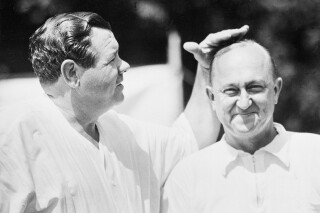Today in History: January 29, Ty Cobb and Babe Ruth become first baseball Hall of Fame inductees

Babe Ruth pats Ty Cobb on the head after their second golf match at Fresh Meadow Country Club in New York on June 27, 1941. The two baseball players are playing a charity grudge tournament with proceeds going to the United Service Organizations. Ruth won today’s match and Cobb won the first match held in Boston, July 26. (AP Photo)
Today in History:
On Jan. 29, 1936, the first inductees of baseball’s Hall of Fame, including Ty Cobb and Babe Ruth, were named in Cooperstown, New York.
On this date:
In 1820, King George III died at Windsor Castle at age 81; he was succeeded by his son, who became King George IV.
In 1919, the ratification of the 18th Amendment to the Constitution, establishing the prohibition of alcohol, was certified by Acting Secretary of State Frank L. Polk.
In 1929, The Seeing Eye, a New Jersey-based school which trains guide dogs to assist the blind, was incorporated by Dorothy Harrison Eustis and Morris Frank.
In 1963, poet Robert Frost died in Boston at age 88.
In 1964, Stanley Kubrick’s nuclear war satire “Dr. Strangelove Or: How I Learned to Stop Worrying and Love the Bomb” premiered in New York, Toronto and London.
In 1979, President Jimmy Carter formally welcomed Chinese Vice Premier Deng Xiaoping (dung shah-oh-ping) to the White House, following the establishment of diplomatic relations.
In 1984, President Ronald Reagan announced in a nationally broadcast message that he and Vice President George H.W. Bush would seek reelection in the fall.
In 1995, the San Francisco 49ers became the first team in NFL history to win five Super Bowl titles, beating the San Diego Chargers, 49-26, in Super Bowl XXIX.
In 1998, a bomb rocked an abortion clinic in Birmingham, Alabama, killing security guard Robert Sanderson and critically injuring nurse Emily Lyons. (The bomber, Eric Rudolph, was captured in May 2003 and is serving a life sentence.)
In 2002, in his first State of the Union address, President George W. Bush said terrorists were still threatening America — and he warned of “an axis of evil” consisting of North Korea, Iran and Iraq.
In 2007, Kentucky Derby winner Barbaro was euthanized because of medical complications eight months after his gruesome breakdown at the Preakness Stakes.
In 2013, the Justice Department ended its criminal probe of the Deepwater Horizon disaster and Gulf of Mexico oil spill, with a U.S. judge agreeing to let London-based oil giant BP PLC plead guilty to manslaughter charges for the deaths of 11 rig workers and pay a record $4 billion in penalties.
In 2017, six people were killed in a shooting at a Quebec City mosque during evening prayers. (Alexandre Bissonnette, who was arrested nearby, pleaded guilty to murder and attempted murder charges and was sentenced to life in prison.)
In 2018, the Cleveland Indians announced that they would remove the Chief Wahoo logo from their uniforms in the coming baseball season, after decades of protests and complaints that the grinning, red-faced caricature was racist. (The Indians changed their name to the Guardians starting in the 2022 season).
In 2022, actor Howard Hesseman, who played a radio DJ on the sitcom “WKRP in Cincinnati” and a teacher on “Head of the Class,” died in Los Angeles at 81.
